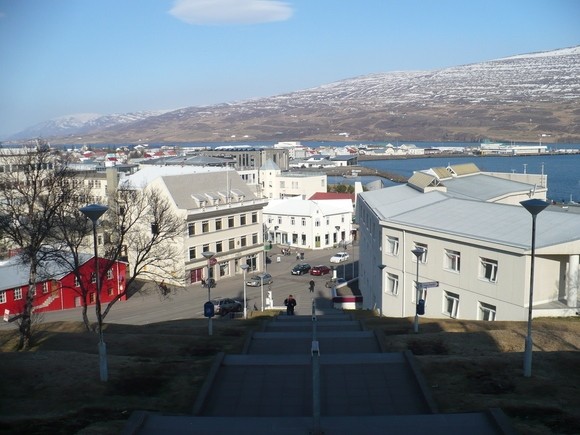Akureyri is Iceland’s second city. It’s not Iceland’s second largest city in terms of population – that honor goes to Kópavogur just south of Reyjkavík – but it is the country’s second city in cultural terms. Akureyri may have just 18,000 residents but with its range of tourist facilities, restaurants, hotels, guesthouses and cultural institutions, it possesses a certain urban atmosphere.
Here are five exciting Akureyri activities:
1. The city’s core – Akureyri Church, designed by Icelandic state architect Guðjón Samúelsson, is an imposing structure with art deco elements. It bears some stylistic similarity to the architect’s much better known Hallgríms Church in Reyjkavík. Across the street is the visit-worthy Center for Visual Arts (Kaupvangsstræti 12). And on Hafnarstræti at the epicenter of town there is Blaá Kannan Cafe, a bustling place to socialize and eat cake.
2. Hof – This culture, conference and performance center also houses a tourist information center, a shop selling lots of nice items (many of them Icelandic) and a cafe. Architecturally, Hof is pretty impressive. The hockey puck-shaped building is round, squat and graced by enormous windows to maximize light. Hof opened in late 2010.
3. Northern lights – Your chance of sighting the aurora borealis from November through April is quite good, assuming clear night skies. Saga Travel offers a night’s excursion for 9000 ISK ($71), including hot chocolate. They’ll take you out the following night if you don’t see the Northern lights on your first trip out.
4. Kjarnaskógur Forest – Iceland doesn’t have many forests to speak of. This one, just south of Akureyri, is one of the best loved in the country. The forest features several walking trails, some accessible at night as well as a dedicated bicycle path. A river runs through the forest.
5. Flóra – This amazing shop, open Thursday through Saturday, sells both new and vintage items, mostly of Icelandic provenance. Notable wares include foodstuffs (tea, honey, syrups), clothes, yarn and artwork. The emphasis is on sustainability across various product lines, and the aesthetic (see above) is homespun yet stylish. Flóra also features exhibitions and occasional talks.
To read the full article, click here.


Comments
article Next
article